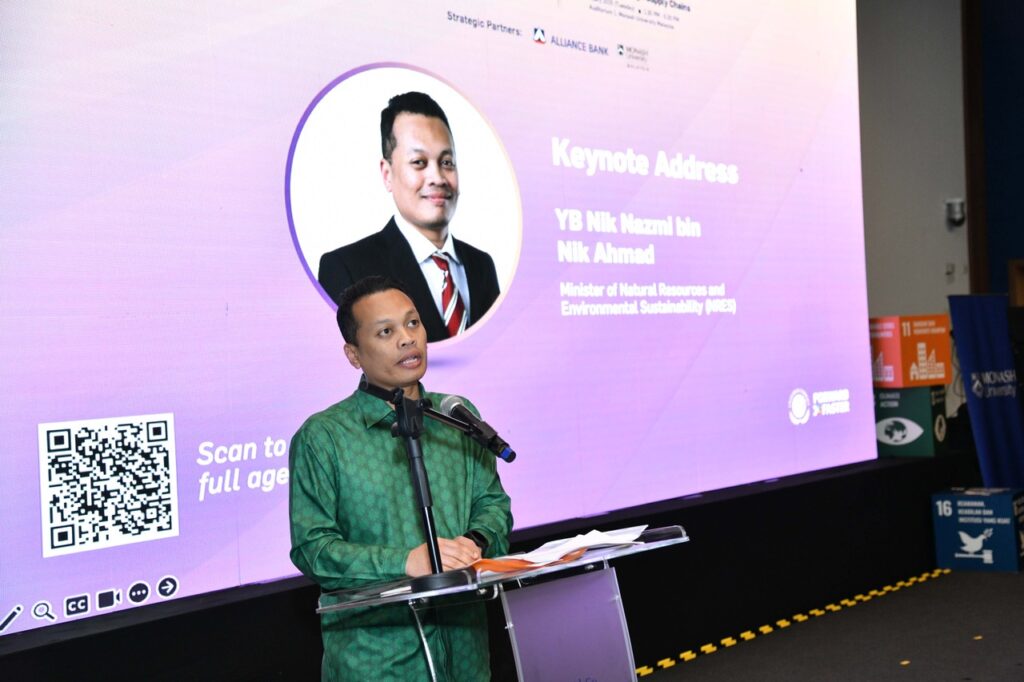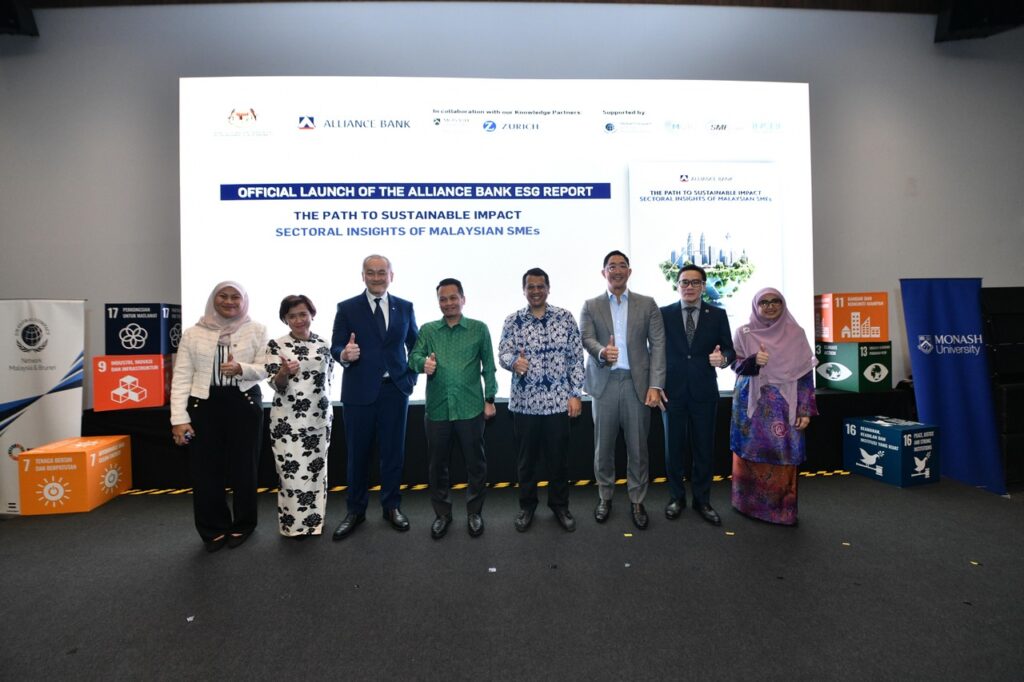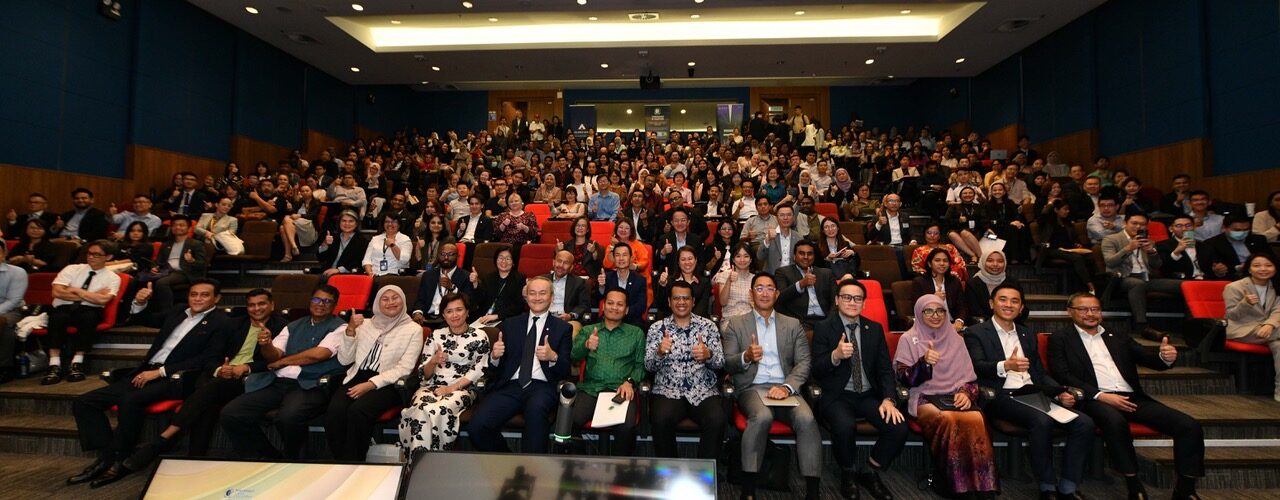21 January 2025, Kuala Lumpur – Malaysian SMEs have witnessed a sixfold surge in ESG (Environmental, Social, and Governance) awareness over the past two years, rising dramatically from 14% to 80%. This key insight comes from Alliance Bank Malaysia Berhad’s (“Alliance Bank”) latest report, The Path to Sustainable Impact – Sectoral Insights of Malaysian SMEs (ESG 2.0 Report), launched at the SME ESG START Symposium 2025, hosted at Monash University Malaysia.

YB Nik Nazmi Nik Ahmad, Minister of Natural Resources and Environmental Sustainability, officiated the launch, lauding Alliance Bank and its collaborators for advancing sustainability efforts among SMEs. Highlighting the critical role of SMEs as the backbone of Malaysia’s economy, he said, “This report is a timely resource to help businesses embrace sustainable practices, ensuring resilience and competitiveness locally and globally.”
“We are aware that sustainability is facing a backlash globally—part of
this stems from anxieties, on the part of individuals and businesses,
that the sacrifice they will be called to make will be too great. Some
have even proclaimed the end or even death of ESG. I think that’s too
much of a stretch, but I also feel it’s true we must wage and win the
war for the hearts and minds, to communicate better and more
compellingly on why ESG matters. We must understand things from
the perspective of SMEs and frame policies that considers their
realities, as well of all stakeholders.” YB Nik Nazmi Nik Ahmad, Minister of Natural Resources and Environmental Sustainability
Strategic Partnerships and Sectoral Insights

Building on the success of the Bank’s inaugural report in 2023, the ESG 2.0 Report was commissioned in collaboration with Monash University Malaysia (“Monash University”) and Zurich Malaysia (“Zurich”) as knowledge partners; with UN Global Compact Network Malaysia & Brunei (“UNGCMYB”), SME Corporation Malaysia (“SME Corp. Malaysia”) as well as INCEIF University as supporting partners. The ESG 2.0 Report examines how SMEs are evolving to meet regulatory, market, and financial demands while capitalizing on sustainability-driven opportunities. Drawing on insights from nearly 400 SMEs, interviews, and secondary research, the report highlights trends, challenges, and motivators shaping the ESG landscape.
Mr. Kellee Kam, Group CEO of Alliance Bank, emphasized the Bank’s commitment to empowering SMEs through its 3As approach: Advocacy, Advice, and Answers. “Our findings demonstrate that ESG practices are not just a necessity but a catalyst for long-term success,” he said. “Through this report, we aim to provide actionable insights and tailored solutions to support SMEs at every stage of their ESG journey.”
Kam shared the following key takeaways from the report:-
- Increased ESG Adoption: 60% of SMEs now adopt ESG practices, a significant
increase from 28% in ESG 1.0, with the manufacturing (69%) and construction
(60%) sectors leading the way. - Primary Motivators: 53% and 51% of ESG adopters cite cost savings and market
demand as key drivers respectively, with “innovation” now cited as Top 3 reason
as a pathway to profitability; - Benefits from ESG adoption: 38% of SMEs that incorporate ESG achieved more
than 51% of increased revenue while 24% of SMEs that incorporate ESG achieved
more than 51% cost savings; - Future Opportunities: Currently, 1 in 2 SMEs (48%) are self-funding their ESG
initiatives, and amongst the non-adopters, 52% plan to implement ESG practices
within 2 years, out of which 13% intend to adopt in less than a year; presenting an
opportunity for various industry stakeholders to support their transition.
Sectoral Highlights and Tailored Approaches
Sector-specific insights revealed stronger ESG adoption in manufacturing compared to the services sector, reinforcing the need for customized strategies to enhance adoption across industries. Monash University Malaysia’s President, Professor Emeritus Dato’ Dr Adeeba Kamarulzaman, noted, “Collaboration is key to driving ESG adoption. We are committed to working with stakeholders to guide SMEs in this journey.”
Collaborating for a Sustainable Future
Junior Cho, Country CEO of Zurich Malaysia, expressed Zurich’s dedication to sustainability, saying, “SMEs have the potential to drive transformative change. Together with Alliance Bank, we aim to empower them with tools and strategies for thriving in an ESG-focused world.”
Alliance Bank Champions SME ESG Growth with Tailored Solutions
Alliance Bank is strengthening ESG adoption among SMEs with a comprehensive suite of personalised financial and beyond banking solutions. These include customised financing options, access to green funding through Bank Negara Malaysia’s Low Carbon Transition Facility and High Tech and Green Facility, as well as competitive rates for initiatives like solar panel installations and green mortgages.
Beyond financing, the Bank collaborates with like-minded industry leaders such as Bursa Malaysia and UNGCMYB to deliver practical ESG assessments, capacity-building programmes and roadmaps, equipping SMEs with the tools they need to integrate sustainable practices into their operations. It also works with a range of green solutions providers to offer pragmatic ESG solutions such as energy efficiency, better water management, and more sustainable waste management solutions.
Advancing ESG with Sectoral Guidance and Clear Goals
To further empower SMEs, Alliance Bank will introduce sector-specific ESG playbooks in 2025-2026, targeting industries like manufacturing, services, construction, and agriculture. These playbooks aim to provide actionable strategies to navigate sustainability challenges effectively. Committed to achieving RM15 billion in sustainable banking business by FY2027, the Bank has already recorded RM13.6 billion since FY2022, reflecting its dedication to fostering a resilient, sustainable economy.
As Malaysia gears up to chair ASEAN in 2025, the ESG 2.0 Report sets the stage for SMEs to play a pivotal role in advancing regional sustainability goals. By fostering resilience and innovation, this initiative aligns with Malaysia’s broader ESG ambitions and commitment to building a sustainable future.
For more information on Alliance Bank’s ESG 2.0 Report and sustainability initiatives, please visit www.alliancebank.com.my/esg-sme-survey-2025








